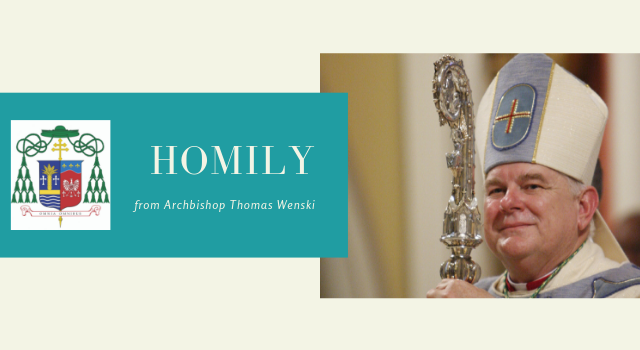By Archbishop Thomas Wenski - The Archdiocese of Miami
Archbishop Thomas Wenski preached this homily during a Mass he celebrated at St. Martha Church, Miami Shores, on the Sixth Sunday of Ordinary Time, Feb. 14, 2021.
Sometimes it’s not so much what we say but how we say it. For example, a “Good morning” can be said with cheerfulness that puts us at ease – or it can be communicated with an “iciness” that would make us want to run for cover.
In the Gospel, the leper says to Jesus, “If you will, you can heal me.” But what might have been his tone of voice? Was it, “Go ahead, you can do it” – encouraging Jesus to perform another miracle? Or was the tone taunting Jesus: “If you want to, you can cure me.” The “if” is in front of the “want,” not the “cure.”
How does Jesus react? Our translation says that Jesus was moved with pity. He felt sorry for him and said, “Of course, I do. Be cured.” Another translation says Jesus reacted with “warm indignation.”
(We encounter the Word of God in translation – and so looking at different translations can help us understand difficult passages better. Not that this is such a difficult passage.)
But if there was somewhat of a taunt or challenge in the leper’s voice, then there must have been something of a hurt protest in Jesus’ response. “Of course, I do!” What the leper is really saying is, “Do you, Jesus of Nazareth, love me, a leper – someone who is an outcast, someone who is feared and despised by the whole world, someone who is ritually impure and in that sense ‘officially’ unlovable?” And Jesus answers, “Of course, I love you – and I do want you to be cured.”
For the past several weeks, our Gospel reading has been taken from St. Mark. And Mark – over the last several Sundays – has been introducing Jesus to us, sort of answering the question, “Who is this Jesus?”
And in Mark we learn that this Jesus is the one who has come to bring the outcast back. He has come for outcasts, outsiders; he has come for the despised, for sinners. He has come for us – “the poor banished children of Eve mourning and weeping in this valley of tears.” Jesus’ mission is to the “lost, the last and the least.” No one is excluded from Jesus’ embrace. For Jesus, no one is unlovable. His mission is to bring each one of us back to the Father: If our exile from God began with Adam’s sin, it ends through Jesus’ obedience.
Jesus’ miracles are suggestive of more than just his power over physical illness. They reveal Jesus’ commitment to a broken and fragile community: He cures the leprosy of the body and so he can cure the leprosy of the soul, which is sin.
Of course, this week our Lenten season begins with Ash Wednesday, and during Lent we are challenged to work on our own relationship with Jesus. So, it might behoove us to pay attention to what Jesus tells the leper to do: “Go, show yourself to the priest...” In other words, he is saying, as part of your healing and your re-entrance into God’s community of believers, present yourself to the priest. It’s what the Jewish tradition required of a leper who was cured – to go to the temple and present evidence of your cure. Of course, we are not Jews – but as Catholics, when we are tainted with the spiritual leprosy of sin, we are told: Go to the priest and confess. Forgiveness of sin isn’t simply tossing off an easy “I’m sorry” to God. As the catechism teaches us, sins committed after baptism are normally forgiven through the sacrament of penance.
So all of us “lepers” should take Lent seriously – and part of taking Lent seriously, besides not eating meat on Fridays, is to make sure we make a good confession. And don’t even think like the leper of the Gospel today that you are out of the reach of God’s love. Does God love you? Jesus answers, “Of course, I do.”
However, we cannot fail to see the irony of it all. The leper once cured is free to circulate once again in his community of family and friends. But as we have already heard, with each miracle Jesus has a harder time doing so. Mark tells us, “Jesus could no longer go openly into any town but had to stay in outside places where nobody lived.” To save outcasts, Jesus himself becomes an outcast.
Or as St. Paul would put it in more theological language: “He who knew not sin became sin.” Already, Mark is “telegraphing” to us how Jesus would accomplish his mission. St. Paul tells us in today’s second reading: “...whatever you do, do everything for the glory of God.” St. Irenaeus – a martyr of the second century – said: “The glory of God is man fully alive; moreover man’s life is the vision of God.” Jesus certainly gave the leper his life back, and through his passion, death and resurrection, we too, “wounded as we are by sin,” also are brought to life, to full life – for we are no longer outcasts but in Christ, sons and daughters of God.
At every Mass, we come before the Lord with our hopes and fears, our joys and sorrows. Our prayers may often have somewhat of the challenging taunt of the leper of today’s Gospel. But to the question, “Lord, do you love me, do you care about me?” The answer is always, “Yes, of course, I do. Be cured!”

